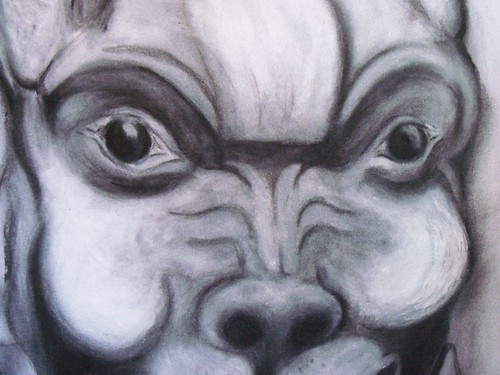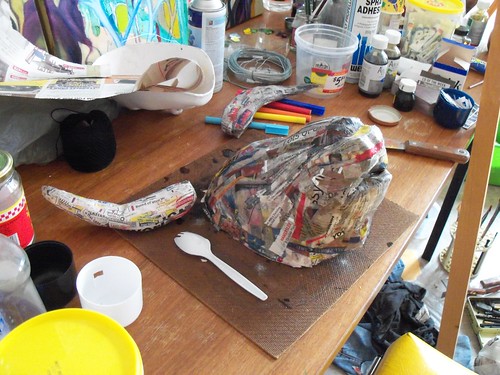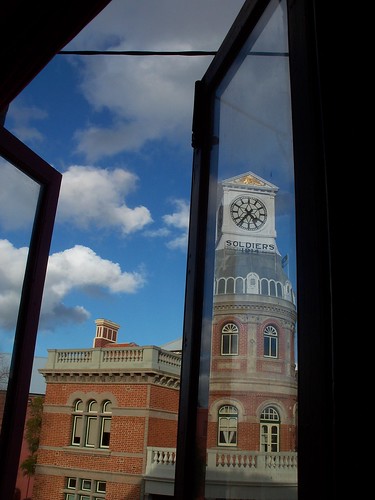 |
| The Elephant of Eastbury: The Book, Laura Mitchell Acrylic and Mixed Media on canvas. via laura-mitchell.com.au |
Can you tell us a little about your background?
I grew up in a
hick town in Virginia, USA and quickly moved to the nearest most
cosmopolitan city I could find (Washington DC) as soon as I could! I
studied music and English Literature in university since I had a very
unpleasant and negative drawing professor early on, but my passion
for visual art won out later when I realised I hated playing in
orchestras. I returned for a MFA in design where for my my MFA thesis
exhibition, I staged a fine art rather than design oriented
multimedia installation based on exploration of a multi-tracked
narrative. I had formerly made several artists books instead of
presenting visual diaries for various critiques during the
coursework. This was the beginning of my passion for the depiction
of “narratives”, stories, or as we say in the design industry
“type and image”. After a career as an art director/graphic
designer in the dot com boom, I moved to Perth and decided to
redirect my energies into fine art which was my original love. I have
a diploma from Central TAFE where I studied sculpture have completed
a few semesters of painting at ECU and Curtin.
I saw your exhibition The Elephant
of Eastbury at Kidogo Gallery in Fremantle earlier this year for
which you had worked collaboratively with poet, Andrew Gates. You
also produced a lovely publication of the same name with the fullpoem text and 10 colour images. How did this collaboration come
about?
The poet, Andrew
Gates of Connecticut in the US was accepted by Littlefox Press to
publish his work. The publisher, Christine Matthieu of Littlefox
Press in Melbourne, then approached me to do the project as a
commission. I had done illustration work for them formerly, and they
knew of my passion for fine art based upon texts or stories.
Christine then connected me with the poet in the US.
 |
| The Elephant of Eastbury: All and Nothing, Laura Mitchell. Acrylic on canvas. Image courtesy of the artist. |
I'm very interested in the
combination of poetry with visual imagery, it can be quite a hard
thing to balance two peoples versions of a narrative and I think
Elephant does this very successfully. Were there any moments when you
didn't agree with each other on how something should be interpreted?
Were you in conversation together throughout the creative process, or
did one of you create work for the other to respond to?
The poet and the editor had already finalised the poem, so I didn't have any influence on the text. There was quite a bit of collaboration regarding the images, however. I first started working on the images from the concept of “childhood memories” - the elephant being a symbol for memory – and the result was a series of still lifes with an elephant. The publisher then felt that there needed to be at least one image more concretely related to the text “the elephant wandering between the ears”which spurred the series of tiny elephants within an abstract background with the outline of an ear. These I was very pleased with. The other was a landscape with elephant and outline of a person's head, which I felt was too “graphic” and a bit forced, but it satisfied the gap the publisher was feeling between the words and the images. Later, I was looking for more inspiration and asked the poet if there was anything more behind the poem, and he told me a very inspiring story (based on reality) of a young child going next door to find his grandmother lying motionless, beside her a tiny bejewelled elephant which was no longer there when he returned having fetched his mother. This then inspired my exploration of death as a journey: the map, airplane, trunk, and glasses left on open book images were a result of this.
The poet and the editor had already finalised the poem, so I didn't have any influence on the text. There was quite a bit of collaboration regarding the images, however. I first started working on the images from the concept of “childhood memories” - the elephant being a symbol for memory – and the result was a series of still lifes with an elephant. The publisher then felt that there needed to be at least one image more concretely related to the text “the elephant wandering between the ears”which spurred the series of tiny elephants within an abstract background with the outline of an ear. These I was very pleased with. The other was a landscape with elephant and outline of a person's head, which I felt was too “graphic” and a bit forced, but it satisfied the gap the publisher was feeling between the words and the images. Later, I was looking for more inspiration and asked the poet if there was anything more behind the poem, and he told me a very inspiring story (based on reality) of a young child going next door to find his grandmother lying motionless, beside her a tiny bejewelled elephant which was no longer there when he returned having fetched his mother. This then inspired my exploration of death as a journey: the map, airplane, trunk, and glasses left on open book images were a result of this.
Who are some of your creative
influences?
I love Kara Walker, with her incredibly powerful “storybook” cut-out images
based on the politics and personal history of women and minorities. I
also enjoy the work of Sally Smart and wonder how much influence she
took from Walker. Another favourite is LA based “low brow” artist
Camille Rose Garcia with her abstract backgrounds and pop culture
inspired foreground figures, one series of which supported endangered
species. My mentor during the Elephant project was Melbourne artist
now relocated to Perth Jo Darvall, whose extremely meticulous
approach to colour and her extremely fine hewn approach to mark making is
inspiring.
 |
| The Elephant of Eastbury: Origins of Meaning, Laura Mitchell Acrylic and mixed media on canvas. Image courtesy of the artist. |
You are also a professional
musician, what do you play? And does playing music inform your visual
work, and visa versa or are they very separate processes?
I play violin
mandolin and sing a bit, but have enlisted 2 great singers to help me
with the latter! Our group is called TrioAlegra & the Velvettes
and consists of violin, mandolin, accordion, double bass, percussion
and of course 3 part vocal harmonies. I have also done session work
for various musicians. I used to have a second band on the go but
that got canned when my second child came along! More time for that
later. My music I would say is a parallel but separate process. For
instance the idea of “consonance vs dissonance” in music I can
relate directly to visual elements such as line, texture, colour.
Harmony and melody and counterpoint I relate to lines and
compositional elements, and “timbre” in music I relate to texture
in visual art. Pitch I suppose for me could be related to tonality
(light & dark) or level of saturation. So in this elemental or
conceptual way each process informs the other, but in terms of
“representing” aural phenomena directly, no I have attempted that
and found it too difficult! I do however love Kandinsky who I believe
sometimes worked in that fashion.
Do you listen to anything when you
are painting? If so, what?
I frequently
listen to nothing but to the sounds around my studio. John Cage was
one of the innovators in the concept of simple random sounds, or even
silence itself, as music. Because music for me is often “work” I
cherish silence. Sometimes I feel obligated to interrupt my art
practice to work on music which can be a dangerous form of
procrastination – not dedicating enough focus to either the art or
the music but getting caught dabbling in both! However having said
that I love Bach, Dub, drum and bass, world music, tom waits,
old-time/bluegrass, Balkan brass bands... jazz jazz and more jazz
and sometimes put my ipod on random while working with all of this
rotating.
You have lived in quite a few
different places around the world but you are now based in Perth.
Have these changes in place had a great influence on you creatively?
And what do you like about where you live now?
I have displaced
myself with migration many times in my life and have thrived on the
challenge of absorbing and attempting to assimilate into a new
culture or place and the different energy and stimulation each new
place has brought me. However I am extremely grateful to be based in
Australia, WA in particular as the fantastic quality and style of
life has afforded me the option to pursue fine art and music as an
independent agent. In the US I lacked confidence of leaving the “job”
as health care is exorbitant without an employer, there are no viable
free health care options there. When I first moved to Perth I didn't
find it particularly creatively stimulating in and of itself, but I
found the space, not just in the landscape but in
 | ||
| The Elephant of Eastbury: Edge of an Ear, Clockwise from Top Left: Bone, Earth, Blood & Water Laura Mitchell. Acrylic and mixed media on canvas. Image courtesy of the artist. |
What's coming up for the rest of
2011 and into 2012?
The Elephant of Eastbury Book will tour
to the US in late 2012 to be presented in 29 Main St. Gallery at
Virginia Commonwealth University in Richmond VA, and on May 11, 2012
I will be participating in a group exhibition on the concept of
“Time” at the Moores Building in Fremantle. My works will be
developed through a collaboration with another poet, William Yeoman
(also Arts Writer/Books Editor for The West). Following the theme of
time, he has written 12 poems following the concept of the
“Horologos” - a set of 12 poems based on each hour of the day
(and night), each with a connection also to a season.
Where can people find out more about
your artwork and music?
Thanks so much,
Claire. My artwork can be viewed on my website, more recent works can
be seen via email or studio visit, simply contact me, details below.
To hear about concerts and exhibitions please go to the contact
section of my website and sign your email in through the form and I
will send notices.
+61 435 054 122 | +61 08 9336
2646




.jpg)


